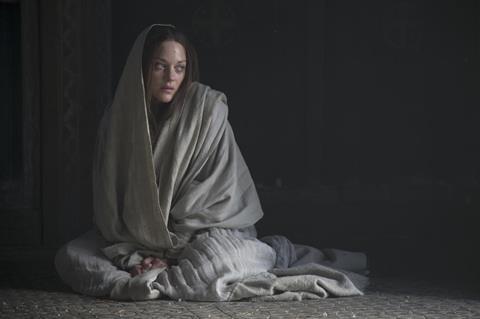Dir. Justin Kurzel. UK/Aus, 2015, 113 mins

Justin Kurzel weighs into Macbeth with a bloody axe and an ambition to rival the Thane of Cawdor’s. Setting the action in a savagely-inhospitable Scotland, the Australian director of Snowtown has the mettle to lay into 400 years of familiarity and reassemble Shakespeare’s Scottish play in a version which may be imperfect, but is also quite unforgettable.
Whatever viewers think of Kurzel’s Macbeth, they won’t be thinking of Polanski’s Macbeth or Welles’ Macbeth or any other Macbeth when they see it – and that’s a considerable achievement in itself.
Kurzel and writers Jacob Koskoff, Todd Louiso and Michael Lesslie have unpicked some of the structure of the Great Bard’s play to produce a film which is obsessed with death, corpses (the film’s opening shot is of an infant in a grave) and the bloody brutality of war in the untamed, barely-civilised world of 11th Century Scotland where ghosts walk amongst the living (Shakespeare is relegated here to a “based on” credit).
Along for the physically-punishing ride is a guerrilla band of actors led by a vital Michael Fassbender in the title role and Marion Cotillard as an oddly detached, French-accented Lady Macbeth, shooting for the most part in gruelling exteriors on location in the wilds of Inverness and the Gothic interiors of Ely Cathedral.
For all that Kurzel’s vision is at heart an old-fashioned, sword-clashing blood-and-guts spectacle, he gives Macbeth a modern sensibility, presenting the Thane’s actions as being provoked by the death of a child and the horrors of war (the well-staged battle and combat sequences, it must be noted, make Braveheart look like a trip to the spa). Kurzel’s witches are, to use an abused term, fantastically organic to the piece.
This, and an overpowering visual aesthetic which pays fulsome tribute to both Kurosawa’s Ran and Nicholas Winding Refn’s Valhalla Rising, could prompt upscale theatrical interest in Macbeth in all markets, skewing towards younger audiences, although this is far too dark for the Romeo + Juliet crowd.
Competing at Cannes, Macbeth suffers from a fundamental weaknesss in the relationship between Macbeth and his wife, however. Cotillard’s Lady Macbeth is too fragile in this partnership, overshadowed by Fassbender and Kurzel’s meaty, masculine vision. The fact that some of her dialogue is occasionally indistinguishable, perhaps due to adverse filming conditions in the wilds of Scotland, doesn’t help. Although he is not a stage actor, Fassbender’s Macbeth is pure and highly physical while Sean Harris proves a revelation as Macduff. David Thewlis lends gravitas as Duncan, while Jack Reynor appropriately lacks presence as Malcolm.
Undaunted by tradition, Kurzel shunts his witches out of their opening sequence and instead filters them through the great battle (only related in the play by a bloody captain) which seals Macbeth’s anointment as the Thane of Cawdor, where he “splits Macdonwald open from his navel to his jawbone’. This is a thinly civilised Scotland living through the Dark Ages, and one of the most consistently engrossing elements of Macbeth is Kurzel’s vision of that harsh world, helped by a tight unit of costume, design and camera.
When we first meet him, Macbeth doesn’t live in a castle, but in a Scandinavian-influenced barn in the wild. His guest, the King of Scotland, Duncan, is housed in a tent. The climate is inhospitable, the conditions gruelling, particularly of battle, the men (and boys) are filthy, dressed in rough cloth. Ghosts mingle with the living – when it’s time for Banquo’s apparition to come and wreck Macbeth’s banquet with his eery presence, he’s just one of many (the dagger Macbeth sees before him is presented by the spectre of a dead soldier; Lady Macbeth performs ‘Out Damned Spot’ to her dead child).
Macbeth is a brutal soldier; the opening battle sequence has an apocalyptic feel, so the appearance of four witches (one is a child, another holds a baby) with their prophecies is satisfyingly apt. The fact that he is, literally, a haunted man from the get-go is convincingly depicted; with Fassbender, the bloodlust is never far from the surface, and his savagery is, via Kurzel, almost operatic.
Kurzel’s technical team, boosted by Jacqueline Durran and her beautiful costuming, is young and bold. Adam Arkpaw’s camera delivers Kurzel’s gothic aesthetic, from the highly composed interiors of Dunsinane to the barren fens of the highlands; the colour palette is deliberate and vivid, leaving the viewer with the blood red of the battle in a way that is very reminiscent of Asian cinema of the 80s and 90s from Ran through to early Zhang Yimou (Judou). Design by Fiona Crombie is notable. Music, by Jed Kurzel, is reliant on those familiar, deep-bass notes.
Whatever viewers think of Kurzel’s Macbeth, they won’t be thinking of Polanski’s Macbeth or Welles’ Macbeth or any other Macbeth when they see it – and that’s a considerable achievement in itself.
Production company: See Saw Films
International sales: StudioCanal
Producers: Iain Canning, Emile Sherman. Laura Hastings-Smith
Screenplay: Jacob Koskoff & Todd Louiso and Michael Lesslie.
Cinematography: Adam Arkapaw
Production design: Fiona Crombie
Costumes: Jacqueline Durran
Main cast: Michael Fassbender, Marion Cotillard, Sean Harris, Paddy Considine, Jack Reynor






![The Brightest SunScreen[Courtesy HKIFF]](https://d1nslcd7m2225b.cloudfront.net/Pictures/274x183/3/5/0/1448350_thebrightestsunscreencourtesyhkiff_312678.jpg)















![The Brightest SunScreen[Courtesy HKIFF]](https://d1nslcd7m2225b.cloudfront.net/Pictures/100x67/3/5/0/1448350_thebrightestsunscreencourtesyhkiff_312678.jpg)

